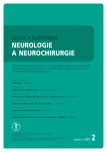Guidelines for Diagnosis and Treatment of Lower Urinary Tract Symptoms in Patients with Multiple Sclerosis in the Czech Republic – Interdisciplinary Expert Consensus Using DELPHI Methodology
Authors:
J. Krhut 1,2; O. Zapletalová 3; R. Zachoval 4–6; E. Meluzínová 7; L. Zámečník 8; M. Vachová 9; E. Houžvičková 7; G. Varga 10
Authors‘ workplace:
Urologické oddělení, FN Ostrava
1; Katedra chirurgických oborů, LF OU v Ostravě
2; Neurologická klinika LF OU a FN Ostrava
3; Urologické oddělení, Thomayerova nemocnice, Praha
4; Urologická klinika 1. LF UK Praha
5; Urologická klinika 3. LF UK Praha
6; Neurologická klinika 2. LF UK a FN Motol, Praha
7; Urologická klinika 1. LF UK a VFN v Praze
8; Neurologické oddělení, Nemocnice Teplice, o. z., Krajská zdravotní, a. s.
9; Urologická klinika LF MU a FN Brno
10
Published in:
Cesk Slov Neurol N 2017; 80/113(2): 233-236
Category:
doi:
https://doi.org/10.14735/amcsnn2017233
Overview
Aim:
Lower urinary tract symptoms are prevalent in approximately 75% of patients suffering from multiple sclerosis (MS) and have significant impact on their quality of life. There is a lack of evidence in many aspects of diagnostics and treatment of lower urinary tract symptoms in MS patients. The aim of the study was to provide guidelines for urologic diagnostics and treatment based on expert opinion in clinical practice in the Czech Republic.
Material and methods:
The guidelines were created using the DELPHI methodology. Comprehensive literature search according to PRISMA statement was performed. Based on this search, the first version of the guidelines was formulated. Members of a panel of experts rated individual items of the guidelines using a 9-point Lickert scale, where 1 means „strong disagreement“ and 9 means „strong agreement“. Subsequently, statistical analysis was performed. All items with rating median of less than 6 were updated. The second version of the guidelines was evaluated using the same technique.
Results:
In total, two rounds of communication were held. The second version of the guidelines was considered final due to high degree of consensus. Compared to the original version, 14 of 58 items were modified during the communication process. Average rating medians of the items included in the final version was 8.22.
Conclusion:
Interdisciplinary consensus was reached using the DELPHI methodology. Resulting guidelines should be used by both urologist and neurologist in routine clinical practice.
Key words:
multiple sclerosis – lower urinary tract symptoms – urinary incontinence – DELPHI
The authors declare they have no potential conflicts of interest concerning drugs, products, or services used in the study.
The Editorial Board declares that the manuscript met the ICMJE “uniform requirements” for biomedical papers.
Sources
1. Fragalà E, Russo GI, Di Rosa A, et al. Association Between the Neurogenic Bladder Symptom Score and Urodynamic Examination in Multiple Sclerosis Patients With Lower Urinary Tract Dysfunction. Int Neurourol J 2015; 19(4):272– 7. doi: 10.5213/ inj.2015.19.4.272.
2. Castel-Lacanal E, Gamé X, Clanet M, et al. Urinary complications and risk factors in symptomatic multiple sclerosis patients. Study of a cohort of 328 patients. Neurourol Urodyn 2015;34(1):32– 6. doi: 10.1002/ nau.22495.
3. Khan F, Pallant JF, Shea TL, et al. Multiple sclerosis: prevalence and factors impacting bladder and bowel function in an Australian community cohort. Disabil Rehabil 2009;31(19):1567– 76.
4. Krhut J, Hradílek P, Zapletalová O. Analysis of the upper urinary tract function in multiple sclerosis patients. Acta Neurol Scand 2008;118(2):115– 9. doi: 10.1111/ j.1600-0404.2008.00992.x.
5. Buljevac D, Flach HZ, Hop WC, et al. Prospective study on the relationship between infections and multiple sclerosis exacerbations. Brain 2002;125(5):952– 60.
6. Krhut J, Hradilek P, Nemec D, et al. Incidence of the urological tumours in patients suffering from multiple sclerosis. Acta Neurol Scand 2014;130(3):193– 6. doi: 10.1111/ ane.12264.
7. Lyn Paul C. A modified Delphi method approach to a new card sorting metodology. J Usability Stud 2008;4:7– 30.
8. Bond KS, Jorm AF, Kitchener BA, et al. Development of guidelines for family and non-professional helpers on assisting an older person who is developing cognitive impairment or has dementia: a Delphi expert consensus study. BMC Geriatr 2016;16(1):129.
9. Esteban M, Salinas J, Arlandis S, et al. Expert consensus on scientific evidence available on the use of botulinum toxin in overactive bladder. Actas Urol Esp 2014;38(4):209– 16. doi: 10.1016/ j.acuro.2013.12.002.
10. Simpson DM, Patel AT, Alfaro A, et al. Onabotulinumtoxin A injection for poststroke upper-limb spasticity: guidance for early injectors from a Delphi panel process. PM R 2017;9(2):136– 48. doi: 10.1016/ j.pmrj.2016.06.016.
11. Moher D, Liberati A, Tetzlaff J, et al. Preferred feporting items for systematic reviews and meta-analyses: the PRISMA statement. Ann Intern Med 2009;151(4):264– 9.
12. Howick J, Chalmers I, Glasziou P, et al. Explanationof the 2011 Oxford Centre for Evidence-Based Medicine(OCEBM) Levels of Evidence (Background Document).Oxford Centre for Evidence-Based Medicine. Available from URL: http:/ / www.cebm.net/ index.aspx?o=5653 (accessed 21 Jan 2017).
13. Stöhrer M, Blok B, Castro-Diaz D, et al. EAU guidelines on neurogenic lower urinary tract dysfunction. Eur Urol 2009;56(1):81– 8. doi: 10.1016/ j.eururo.2009.04.028.
14. Amarenco G, Chartier-Kastler E, Denys P, et al. First-line urological evaluation in multiple sclerosis: validation of a specific decision-making algorithm. Mult Scler 2013;19(14):1931– 7. doi: 10.1177/ 1352458513489758.
15. Çetinel B, Tarcan T, Demirkesen O, et al. Management of lower urinary tract dysfunction in multiple sclerosis: a systematic review and Turkish consensus report. Neurourol Urodyn 2013;32(8):1047– 57. doi: 10.1002/ nau.22374.
16. Fowler CJ, Panicker JN, Drake M, et al. A UK consensus on the management of the bladder in multiple sclerosis. Postgrad Med J 2009;85(1008):552– 9. doi: 10.1136/ jnnp.2008.159178.
17. Phé V, Pakzad M, Curtis C, et al. Urinary tract infections in multiple sclerosis. Mult Scler 2016;22(7):855– 61. doi: 10.1177/ 1352458516633903.
Labels
Paediatric neurology Neurosurgery NeurologyArticle was published in
Czech and Slovak Neurology and Neurosurgery

2017 Issue 2
Most read in this issue
- Ulnar Nerve
- Stroke Incidence in Europe – a Systematic Review
- Anti-NMDAR Encephalitis in Children – a Case Report
- Febrile Seizures – Guidelines for Examination of a Child with Simple Febrile Seizures, Adapted from the Guidelines of the American Academy of Pediatrics
